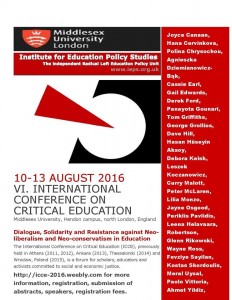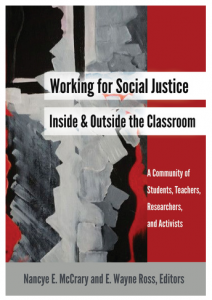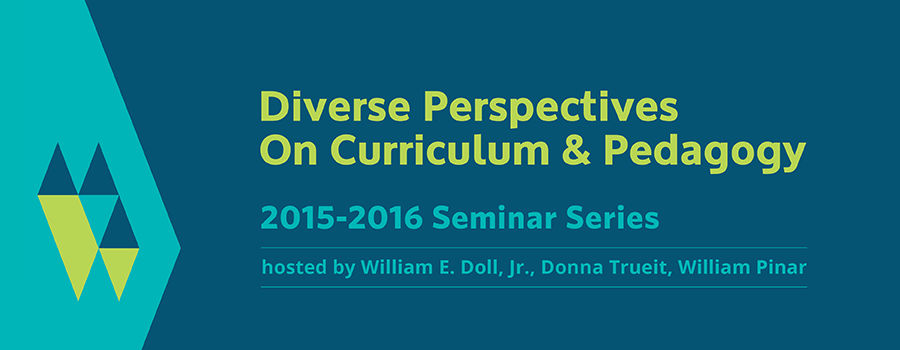Critical Education Special Series: Call for Papers
(Re)Considering STEM Education: A Special Series in Critical Education
Series Co-editors:
Mark Wolfmeyer, Ph.D., Kutztown University of PA
wolfmeyer@kutztown.edu
John Lupinacci, Ph.D., Washington State University
john.lupinacci@wsu.edu
Critical Education provides a space for inquiry into the philosophies and contexts of educational priorities set by today’s global elite and the role of STEM Education in the political and economic restructuring of education and educational research. The time is now for an ongoing, dedicated space that deconstructs and reconstructs the interdisciplinary, ubiquitous, powerful and perhaps dangerous STEM (Science, Technology, Engineering and Mathematics). The series title reflects our concerns and suggests a space for dedicated inquiries taking up oppositions to—and substantive and timely reframings of—STEM. It is the desire of the editors of this series to cultivate a series of articles from a diverse array of educational research occurring both within and from outside the critical-foundations community. The special series continues a long tradition of such critique, at least those occurring in STEM related journals like For the Learning of Mathematics, Journal of Urban Mathematics Education and Cultural Studies of Science Education, and will be the first location dedicated specifically to critical explication of STEM on the whole.
We invite manuscripts that contribute to understanding and defining STEM education in a variety of ways, from critical curricular and pedagogic explorations of STEM contents on their own and in total, to broader conception of STEM such as the infiltration of STEM culture throughout higher education and research programs. In considering STEM, we especially seek explorations (re)considering how STEM perpetuates systems of domination and hierarchy while potentially offering unexpected moments for reformations that foster alternatives. In other words, how is mainstream STEM a part of the problem? In (re)considering STEM, we hope contributions will provide the opportunities for scholarly projects that range from policy to grant research, curriculum to media, experiences in STEM education from diverse students, and from teacher innovation to student resistance.
The issue aims to critique STEM but also present it as a space for critical examinations that move beyond the traditional perspectives reproducing the dominance of STEM. Such endeavors might include but are not limited to manuscript submissions that draw from a variety of frameworks appropriate to critical-foundations work, including critical theories like, ecojustice education, critical race theory and critical disability studies and with goals that counter neoliberal projects and embrace community, democracy, anarchism and anti-capitalism. In general, this series seeks to foster an ongoing scholarly conversation through manuscripts that broadly engage the question: How are critical scholars engaging and working within STEM educational spaces and/or habits of mind?
All manuscripts, including references and notes, should be 4000-6000 words. Authors are encouraged to submit complete manuscripts that match this call for papers as soon as possible. For now, this is an open call lasting at least through December, 30 2016.
All manuscripts are subject to the journal’s blind peer review process and are to be submitted online at http://ices.library.ubc.ca/index.php/criticaled/about/submissions#onlineSubmissions).
Pending review and the editors’ approval, articles will be published in this special series of Critical Education. Articles should follow the journal style guidelines of APA 6th Edition
(For info: http://ices.library.ubc.ca/index.php/criticaled/about/submissions#authorGuidelines)
We also encourage essay reviews of books on these subjects. For more information about submitting a book review contact the editors. Reviews should be approximately 2500 words.
If you have any further questions, please don’t hesitate to contact us.
Mark Woflmeyer (wolfmeyer@kutztown.edu) and John Lupinacci (john.lupinacci@wsu.edu)

 Follow
Follow







Do private programs belong at public universities?
The University of Victoria has contracted with the Canadian telecom giant Telus to deliver a “customized” MBA program to Telus employees.
Telus executives will be teaching some of the courses; the instructors from UVic will apparently be teaching on contracts separate from their regular employment with the university. The details are sketchy because the agreement between the UVic and Telus is secret.
Here’s university’s press release on the new program, which is offered in the Sardul S. Gill Graduate School within UVic’s Peter B. Gustavson School of Business. The program gets started this month.
The program is the brain child of Telus’s “Chief Envisioner,” Dan Pontefract. Pontefract described the context and goals of the program in an Forbes magazine article this past August, “Going Back To School With A Corporate MBA Program.” (A Huffington Post version of the article appeared in September, “Why Corporations Should Launch Their Own MBA Programs“).
Victoria’s Times-Colonist and The Tyee have also run articles about the program.
Neither Telus nor UVic have (or plan to) release details of the financial agreement, as The Times-Colonist reports
The program raises a raft of questions about academic governance, academic freedom, the vulnerability of public universities to corporate incursions as a result of budget slashing governments.
This program represent the next step in the ever evolving corporatization of the university, another neoliberal education policy that socializes costs and privatizes benefits.
I appeared on CBC Radio’s The 180 with Jim Brown (along with Pontefract) to discuss the UVic/Telus MBA program and the corporatization of academe.
The 12 minute segment will be broadcast tomorrow (October 4, 2015), but you can stream the segment online now: Do private programs belong at public universities?
Leave a comment
Posted in BC Education
Tagged CBC, cdnpse, Commentary, Corporate University, Critical Education, higher education, interview, post-secondary education, public education, radio interview, Telus, The 180 with Jim Brown